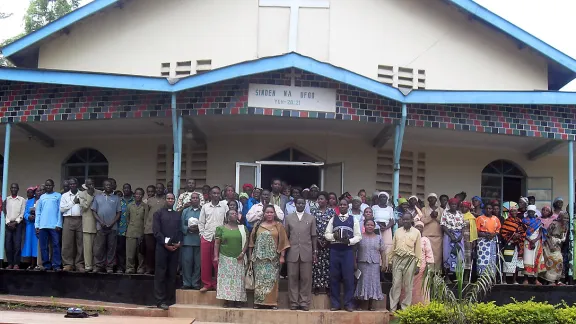
ELCTâs HIV and AIDS awareness building efforts includes seminars for married couples. Photo: ELCT
Empowering vulnerable women helps saves lives
(LWI) – Eunice, a 27-year-old Tanzanian mother of five-month old twins lives with HIV. So do her babies.
“What will I do? My children and I are HIV positive,” she asks.
Eunice’s husband divorced her while she was pregnant, because he suspected that she had contracted the AIDS virus, although she had not taken an HIV test during the pregnancy. The twins’ slow development after birth prompted her to find out their status, which turned out to be HIV positive.
Eunice has suffered under the burden of poverty and HIV, but today the family is receiving antiretroviral treatment, nutritional support and financial assistance. She has started a small business to meet her family’s basic needs.
Much of this support comes from the local congregation of the Evangelical Lutheran Church in Tanzania (ELCT). The pastor has mobilized funds from parishioners to assist Eunice and the children with clothes and other materials.
“Through the church, Eunice has improved her life, health and nutritional wellbeing,” said Mary Mmbaga, the ELCT HIV and AIDS coordinator. “Eunice has confidence, dignity and self-esteem. The children are doing well. Besides the difficulties, she is happy and able to interact with her neighbors.”
Mmbaga said this kind of local HIV and AIDS support provided by the ELCT congregations throughout Tanzania has sparked discussion on a number of related topics between the generations, genders and other groups.
“This is a major change for our congregations, parishes, church districts, dioceses, communities and households,” she noted.
And it is a welcome change.
Tanzania is one of the sub-Saharan African countries that has been hardest hit by the AIDS pandemic, with 1.4 million people living with HIV in the population of nearly 50 million people. In 2013 alone, the country had more than 73,000 newly infected persons.
Despite these figures, the scaling up of antiretroviral treatment has helped to control the epidemic.
Still, poverty, which drives girls to succumb to unsafe sex at an early age, and the lack of access to education, information and reproductive healthcare for women, mean the elimination of HIV and AIDS remains a monumental task, according to Mmbaga. It is estimated that 690,000 women and girls are living with HIV in Tanzania.
The ELCT, which has long provided education and health care services, including hospitals and medical training, continues to address the harmful practices that lead to infection. “Social and cultural practices such as female genital mutilation, and lack of awareness about the risks of early marriage for girls are among the factors that largely impede the strategy against HIV and AIDS,” she added.
She noted that the ELCT “has done a good job” of tackling the stigma around HIV and AIDS. “But it must confront the cultural edicts that give men control over women to the extent that women are left on their own should they become infected,” she added.
“There is no doubt women are more vulnerable than men when it comes to the cultural dynamics of power. But if empowered, they are able to not only save their own lives but also ensure the wellbeing of their children and other family members,” Mmbaga argued. It is important to empower churches and communities with education and knowledge on gender justice, which is an important focus of LWF’s work with its member churches globally, she concluded.


